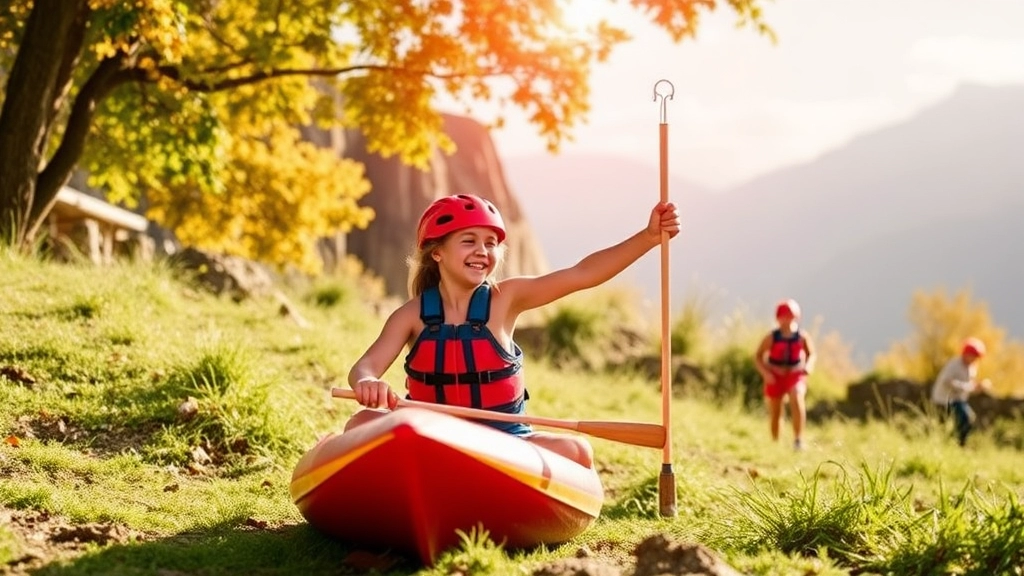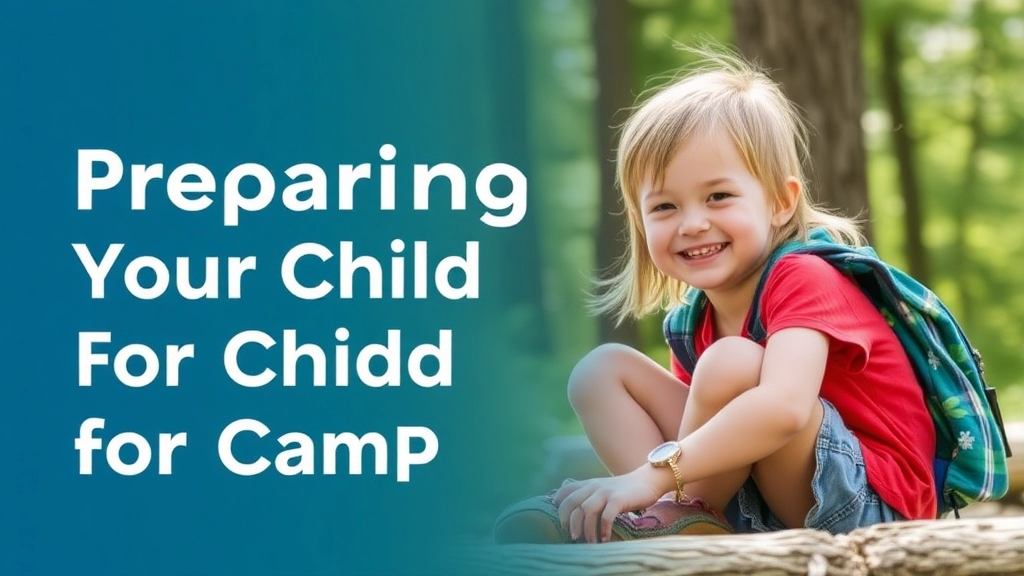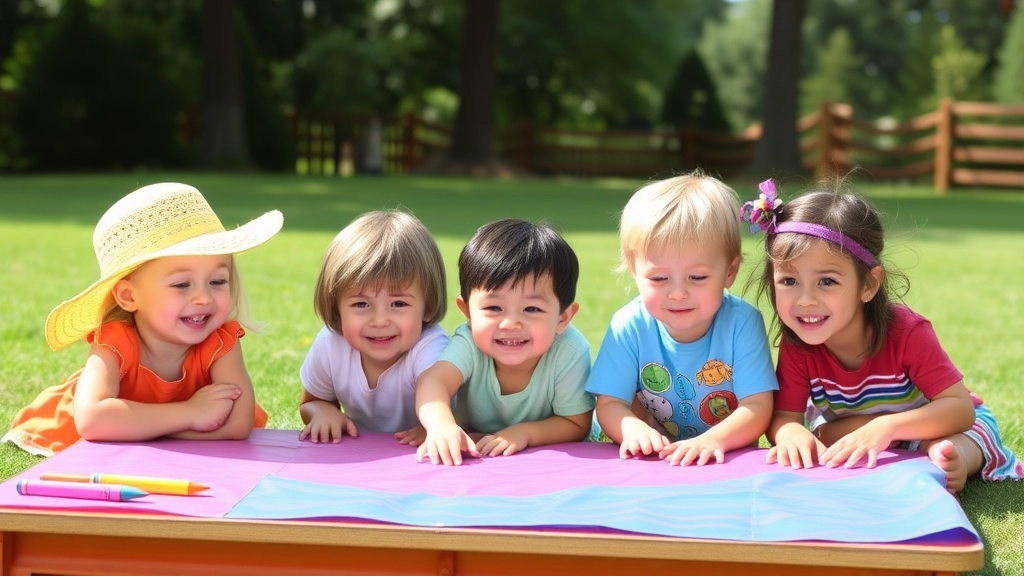Are you ready to give your child an unforgettable summer experience?
Pre-kindergarten summer camps offer a treasure trove of benefits that go beyond just keeping the little ones busy. From boosting social skills and independence to fostering cognitive and emotional growth, these camps are designed to set a solid foundation for your child’s future. In this article, we’ll dive into the myriad of activities offered, how to choose the right camp, essential safety measures, and much more.
Choosing the Right Camp
Choosing the right pre-kindergarten summer camp can feel overwhelming, but don’t worry—we’ve got you covered. We’ll guide you through the enrollment process, budget considerations, and even what to pack to ensure your child has a seamless and enjoyable experience. Plus, hear firsthand testimonials from parents who have seen the transformative power of these camps.
Get Ready for an Adventure!
So, buckle up and get ready to make this summer the best one yet for your little adventurer!
Benefits of Pre Kindergarten Summer Camps
So, you’re wondering if pre-kindergarten summer camps are worth it, right? Let me break it down for you. Summer camps for the little ones aren’t just about filling up their time; they’re about setting a solid foundation for their future. Here’s how.
Social Skills Galore
First off, social skills. Kids get to interact with peers outside their usual circle. They learn to share, cooperate, and communicate. Think of it as a mini boot camp for real-world social interaction. They’ll come out more confident and ready to tackle the next school year.
Boosting Independence
Next up, independence. At camp, they’re not just following mum or dad around. They get to make small decisions on their own, like choosing between activities or managing their snack time. These little choices add up, making them more self-reliant.
Physical Activity
Let’s not forget about physical activity. Camps are packed with activities that get kids moving. From swimming to obstacle courses, they’re burning off that endless energy in a productive way. Plus, it’s a great counter to all that screen time.
Cognitive Development
Then there’s the cognitive development. Camps often include educational activities disguised as fun. Think science experiments, arts and crafts, and problem-solving games. These activities stimulate their young minds and keep them curious.
Emotional Growth
Lastly, there’s emotional growth. Being away from home, even for a few hours, can be a big deal for little ones. It helps them handle separation anxiety and builds resilience. They learn to cope with new situations, making them emotionally stronger.
Real-Life Example
Take my friend Sarah’s kid, for example. Before camp, her son was super shy and clingy. After just one summer, he was more outgoing and even made a bunch of new friends. It was a game-changer for him and a huge relief for Sarah.
The Bottom Line
So, if you’re on the fence about pre-kindergarten summer camps, think of it this way: It’s not just a way to keep your child busy; it’s an investment in their future. From social skills to emotional growth, the benefits are too good to pass up.
By the way, if you’re curious about what types of activities these camps offer, you should definitely check out the best summer camps for 2-year-olds. Spoiler alert: It’s way more than just finger painting.
And if you’re looking for options in specific locations, you might want to explore the top summer camps in Frisco for some great recommendations.
Types of Activities Offered

Alright, let’s dive into the fun stuff – the types of activities offered at pre-kindergarten summer camps.
Wondering what your little one will actually do all day?
I get it. You want your child to have a blast, learn a bit, and maybe even make some friends.
Here’s the deal:
These camps pack in a variety of activities that keep kids engaged, active, and learning without them even realising it.
1. Arts and Crafts
- Painting sessions
- Craft projects like making masks or decorating pots
- Clay modelling
2. Outdoor Play
- Nature walks to explore the great outdoors
- Playground time with swings and slides
- Water play with sprinklers and paddling pools
3. Story Time
- Interactive storytelling sessions
- Puppet shows
- Reading circles where kids can explore picture books
4. Music and Dance
- Sing-alongs with popular nursery rhymes
- Dance parties to burn off some energy
- Musical instruments exploration
5. Educational Games
- Puzzle time
- Matching games
- Basic science experiments like baking soda and vinegar volcanoes
6. Social Skills Activities
- Group games that encourage teamwork
- Role-playing activities
- Circle time discussions
7. Sports and Physical Activities
- Mini soccer games
- Obstacle courses
- Yoga for kids
8. Themed Days
- Pirate Day
- Superhero Day
- Animal Safari Day
So, when you’re thinking about sending your child to a pre-kindergarten summer camp, remember it’s not just about keeping them busy.
It’s about giving them a variety of experiences that help them grow and learn in a fun, safe environment.
How to Choose the Right Camp
Alright, let’s dive straight into it. Choosing the right pre-kindergarten summer camp can feel like a mission, right? You’re probably wondering, “How do I know if this camp is the best fit for my little one?” Don’t worry, I’ve got you covered.
Key Questions to Ask
First off, let’s tackle the big questions:
- What type of activities does the camp offer? You want a camp that aligns with your child’s interests. Whether it’s arts and crafts, outdoor adventures, or educational games, make sure the camp’s activities excite your kiddo.
- What is the camp’s philosophy? Some camps focus on free play, while others have structured learning. Know what you’re signing up for.
- What are the qualifications of the staff? Safety first, always. Ensure the staff is trained and experienced in handling young children.
Types of Camps
There are different types of camps to consider:
- Day Camps: These are perfect if you want your child to come home every evening. They’re usually packed with fun activities and social interaction.
- Specialty Camps: If your child has a particular interest, like music or sports, a specialty camp can be a great fit.
- Educational Camps: These camps focus on learning through play, combining fun with educational activities.
Tips for Choosing the Right Camp
Here’s a quick checklist to help you choose the right camp:
- Visit the Camp: If possible, take a tour. Seeing the facilities and meeting the staff can give you a better idea of what to expect.
- Read Reviews: Check out testimonials and reviews from other parents. This can give you insights into the camp’s strengths and weaknesses.
- Ask About Safety Measures: Ensure the camp has robust safety protocols in place. This includes first aid, emergency plans, and staff-to-child ratios.
- Consider the Camp’s Schedule: Make sure the camp’s schedule aligns with your family’s routine. You don’t want to be stressed out about pick-up and drop-off times.
- Evaluate the Cost: While you want the best for your child, it’s essential to find a camp that fits within your budget. Look for any hidden fees or extra costs.
Real-Life Example
Let me share a quick story. A friend of mine was in the same boat last summer. She was torn between two camps for her 4-year-old. One was a general day camp with a mix of activities, and the other was a specialised art camp. She visited both, talked to the staff, and read reviews. In the end, she chose the art camp because her daughter loved painting. It turned out to be a fantastic decision. Her daughter had a blast and even brought home some impressive artwork.
Final Thoughts
Choosing the right pre-kindergarten summer camp doesn’t have to be a daunting task. By asking the right questions and doing a bit of homework, you can find a camp that your child will love and where they’ll thrive. Remember, the goal is to make this summer memorable and enriching for your little one.
So, take a deep breath, grab a cup of coffee, and start your search. You’ve got this!
For more ideas on how to make your child’s summer unforgettable, check out our summer camp activity ideas and discover how to secure funding for summer camps.
Safety Measures and Protocols

Alright, let’s talk safety.
How safe is this summer camp?
That’s the first question every parent asks.
And rightly so.
When it comes to pre-kindergarten summer camps, safety is non-negotiable.
Here’s how camps ensure your little ones are safe and sound:
1. Staff Training and Qualifications
- Qualified Staff: Camps hire staff with childcare experience and proper certifications.
- First Aid Training: Every staff member is trained in first aid and CPR.
- Background Checks: Thorough background checks are done on all employees.
2. Child Supervision
- Low Child-to-Staff Ratios: This ensures each child gets enough attention.
- Constant Supervision: Kids are never left alone. Ever.
3. Secure Facilities
- Gated Entrances: Only authorised personnel can enter.
- ID Check: Pick-up and drop-off require ID verification.
- Safe Play Areas: Equipment and play areas are regularly inspected.
4. Health Protocols
- Sanitisation: Regular cleaning of all areas and equipment.
- Illness Policies: Clear guidelines on what to do if a child gets sick.
- Hand Hygiene: Encouraging regular hand washing.
5. Emergency Preparedness
- Emergency Drills: Regular fire and emergency drills.
- Emergency Contacts: Up-to-date contact information for all children.
- Quick Response Plans: Clear procedures for emergencies.
6. Nutrition and Allergies
- Healthy Meals: Nutritionally balanced meals and snacks.
- Allergy Awareness: Staff are trained to handle allergies and dietary restrictions.
So, there you have it.
Camps put a lot of thought into safety measures.
And it’s not just about ticking boxes.
It’s about peace of mind.
Your child’s safety is their top priority.
Want to know more about camp safety?
Check out the testimonials and reviews from other parents who’ve been there, done that.
Safety first, always.
Ready to dive into more details?
Or, if you’re prepping for camp, see What to Pack for Pre Kindergarten Summer Camp.
Stay safe and happy camping!
Cost and Budget Considerations for Pre-Kindergarten Summer Camps
Worried About the Cost of Summer Camps?
Hey, I get it. The thought of sending your little one to a pre-kindergarten summer camp can raise some real questions about cost. Is it worth it? How do you budget for it? Let’s break it down.
Why Does Camp Cost So Much?
Camps can be pricey, but there’s a reason for it. You’re paying for:
- Qualified Staff: These folks know how to handle kids and keep them engaged.
- Materials and Supplies: From art supplies to sports equipment, it all adds up.
- Facilities: A safe and fun environment isn’t cheap to maintain.
How to Budget for Camp
Here’s how I’d tackle it:
- Set a Realistic Budget: Know what you can afford before you start looking.
- Compare Camps: Look at what each camp offers. Sometimes paying a bit more gets you a lot more.
- Look for Discounts: Early bird specials, sibling discounts, or even scholarships.
Breaking Down the Costs
Here’s a quick table to give you an idea:
| Expense Category | Estimated Cost Range |
|---|---|
| Registration Fees | £50 – £100 |
| Weekly Tuition | £150 – £300 |
| Extra Activities | £20 – £50 per activity |
| Transportation | £30 – £60 per week |
Real Stories from Parents
I once chatted with a parent who found a camp that seemed expensive at first. But after seeing their child come home every day, buzzing with excitement and new skills, they realised it was a solid investment.
Making the Most of Your Investment
- Ask About What’s Included: Meals? Field trips? Know what you’re paying for.
- Plan Ahead: Start saving early. A little each month can make the cost feel less daunting.
- Consider Value, Not Just Price: Sometimes spending a bit more means your child gets a richer experience.
For more tips on choosing the right camp, head to our section on average price of summer camps. And if you’re curious about what to pack, check out our summer camp packing checklist.
Got more questions? Dive into our Frequently Asked Questions section for all the answers you need!
Preparing Your Child for Camp

Worried about how to get your little one ready for pre-kindergarten summer camp?
You’re not alone.
Every parent has those jitters.
But don’t sweat it.
Let’s break it down so it’s easy-peasy for both you and your child.
Start Talking About Camp Early
Kids love stories.
So, start chatting about camp a few weeks before it kicks off.
Tell them how much fun they’ll have, the new friends they’ll meet, and all the cool activities they’ll do.
Visit the Camp Together
If possible, take a trip to the camp beforehand.
Let your child see the place, meet some of the staff, and get a feel for the environment.
It makes the unknown a bit more known.
Routine, Routine, Routine
Kids thrive on routine.
In the weeks leading up to camp, start mimicking the camp schedule at home.
Wake up, meal times, nap times – get them used to the new rhythm.
Pack Together
Make packing a fun activity.
Let your child help choose their clothes, snacks, and toys.
It gives them a sense of control and excitement.
Practice Independence
Camp is a great place for kids to learn independence.
Start small at home:
- Let them dress themselves.
- Encourage them to tidy up their toys.
- Teach them to ask for help when they need it.
Role-Playing
Kids love pretend play.
So, why not role-play some camp scenarios?
Pretend you’re the camp counsellor and they’re the camper.
Act out saying goodbye, joining activities, and making new friends.
Talk About Feelings
It’s normal for kids to feel a mix of excitement and nervousness.
Talk about these feelings openly.
Let them know it’s okay to miss home and reassure them that you’ll be there to hear all about their adventures.
Read Books About Camp
There are tons of children’s books about going to camp.
Reading these together can help your child understand what to expect and get excited about the experience.
Stay Positive
Your attitude will set the tone.
Stay upbeat and positive about camp.
If you’re excited, they’ll be excited too.
Last-Minute Tips
- Label Everything: From clothes to water bottles.
- Emergency Contacts: Make sure the camp has all your contact info.
- Health Check: Ensure your child’s health records are up to date.
Testimonials and Reviews from Parents
Wondering if a pre-kindergarten summer camp is worth it? You’re not alone. Many parents have the same question. So, let’s dive into what real parents have to say about their experiences. I’ll break it down for you, no fluff, no cringe, just the real deal.
Why Testimonials Matter
First off, why should you care about testimonials? Simple. They give you a peek into the real-world benefits and potential drawbacks of sending your child to a pre-kindergarten summer camp. It’s like getting advice from a friend who’s been there, done that.
Real Stories, Real Experiences
“My daughter was shy and had trouble making friends,” says Sarah, a mum from Manchester. “After just two weeks at camp, she came home talking about all her new pals. It was like a switch flipped. She’s more confident now, and I couldn’t be happier.”
“We were worried about safety,” shares John, a dad from London. “But the camp had strict protocols in place. They even had a nurse on-site. Knowing my son was in a safe environment allowed me to relax and focus on work.”
Common Themes in Reviews
When you sift through parent reviews, a few common themes pop up:
- Social Skills: Many parents rave about how their kids come out of their shells.
- Confidence Boost: Kids return home more self-assured and ready to tackle new challenges.
- Safety: Camps with solid safety measures get high marks.
- Fun Activities: Parents love the variety of activities that keep their kids engaged and learning.
What to Look For
When reading testimonials, keep an eye out for:
- Consistency: Are multiple parents praising the same aspects?
- Specifics: Look for detailed reviews that give you a clearer picture.
- Balance: Not every review will be glowing. Consider the negatives too, but weigh them against the positives.
Final Thoughts
If you’re still on the fence, let these testimonials guide you. Real parents have been in your shoes and their insights can be invaluable. So, take the plunge and give your child a summer to remember.
Ready to hear more from real parents? Check out our ultimate guide to boys and girls summer camps. It’s packed with first-hand accounts that’ll give you the confidence to make an informed decision. Trust me, it’s worth a look.
Got questions? Dive into our comprehensive guide on summer camp schedules and activities where we tackle everything from safety protocols to activity schedules. You’ll find answers to the most common queries parents have.
Enrolling and Registration Process

Alright, so you’re thinking about enrolling your little one in a pre-kindergarten summer camp, huh?
Great choice!
But how do you get started?
What should you look out for?
Let’s break it down.
Why Enrolling Early Matters
First off, timing is everything.
Camps fill up fast, and you don’t want your kid to miss out.
Plus, early birds often get discounts.
So, set a reminder and get on it ASAP.
Steps to Enrol
- Research Camps:
- Check out different options.
- Look at reviews and testimonials.
- See what activities they offer.
- Visit the Camp:
- If possible, visit the camp.
- Speak to the staff.
- Get a feel for the environment.
- Check Availability:
- Camps have limited spots.
- Make sure there’s room for your child.
- Fill Out Forms:
- Most camps require detailed forms.
- Be ready to provide medical info, emergency contacts, and any special needs.
- Pay the Fee:
- Camps usually require a deposit.
- Some offer payment plans.
What You Need to Know
- Deadlines: Mark them on your calendar.
- Refund Policies: Life happens. Know the camp’s refund policy in case plans change.
- Required Documents: Birth certificate, immunisation records, and maybe even a recent photo.
Pro Tips
- Ask Questions: Don’t be shy. Ask about staff qualifications, safety protocols, and daily schedules.
- Join Parent Groups: Online forums or local groups can provide insider tips and recommendations.
- Stay Organised: Keep all documents and receipts in one place. You’ll thank yourself later.
What to Pack for Pre Kindergarten Summer Camp
Alright, let’s dive into a common worry for many parents: What to pack for pre-kindergarten summer camp? I get itâsending your little one off to camp can be nerve-wracking. You want to make sure they have everything they need but without overloading them. So, let’s break it down.
Essentials to Pack
First things first, let’s talk essentials. These are the must-haves for any pre-kindergarten summer camp:
- Backpack: A small, easy-to-carry backpack is crucial. It should be big enough to hold all the essentials but not too bulky.
- Water Bottle: Hydration is key. Pack a spill-proof water bottle that your child can easily open and close on their own.
- Snacks and Lunch: If the camp doesn’t provide meals, pack healthy snacks and a lunch. Think easy-to-eat items like fruit slices, sandwiches, and crackers.
- Change of Clothes: Accidents happen. Pack a full change of clothes, including underwear and socks, in a ziplock bag.
- Sunscreen: A small bottle of sunscreen is essential. Make sure to apply it before they leave and teach them how to reapply.
- Hat and Sunglasses: Protect those little eyes and skin from the sun.
Clothing Tips
Now, let’s get into clothing. Comfort and practicality should be your guiding principles here:
- Comfortable Shoes: Sneakers are a great choice. Avoid sandals or flip-flops as they can be unsafe during active play.
- Weather-Appropriate Clothing: Dress them in layers. Mornings can be cool, but it warms up quickly. A light jacket or hoodie can be a good idea.
- Label Everything: Use permanent markers or labels to mark your child’s name on all their belongings. Trust me, it saves a lot of hassle.
Special Items
Depending on the camp’s activities, you might need to pack a few special items:
- Swim Gear: If there’s swimming involved, pack a swimsuit, towel, and swim shoes.
- Art Supplies: Some camps might require specific art supplies. Check the camp’s list and pack accordingly.
- Comfort Item: A small stuffed animal or blanket can help ease any homesickness.
Packing Tips
Here are some quick tips to make packing a breeze:
- Use Ziplock Bags: Organise items in ziplock bags. This keeps things neat and makes it easier for your child to find what they need.
- Check the Weather: Always check the weather forecast and pack accordingly. Raincoat for rainy days, extra sunscreen for sunny days.
- Involve Your Child: Let your child help with packing. It makes them feel involved and helps them know what’s in their bag.
Real Talk
Look, I get that packing for camp can feel like prepping for a mini expedition. But keep it simple. You don’t need to pack the entire wardrobe. Stick to the basics, and you’ll be golden. And hey, if you forget something, camps usually have extras or ways to work around it.
So there you have it, a no-nonsense guide on what to pack for pre-kindergarten summer camp. Follow these tips, and you’ll set your child up for a fantastic camp experience.
Got more questions? Check out our ultimate packing checklist or read some creative summer camp themes to see how others have handled it. Happy packing!
Frequently Asked Questions
Alright, let’s dive into the nitty-gritty. I know you’ve got questions about pre-kindergarten summer camps, and I’m here to give you the lowdown. No fluff, just straight-up answers.
What’s the Ideal Age for Pre-Kindergarten Summer Camps?
Most camps are geared towards kids aged 3 to 5. But hey, check with the camp for their specific age requirements.
How Long Do These Camps Last?
Typically, pre-kindergarten summer camps run for 1 to 2 weeks. Some might offer daily sessions, while others go for full weeks. It’s all about what fits your schedule.
What Activities Will My Child Be Doing?
Expect a mix of fun and learning. Think arts and crafts, outdoor play, storytime, and even some basic educational activities.
Are These Camps Safe?
Absolutely. Safety is a top priority. Camps follow strict safety measures and protocols. Always ask about their safety guidelines to be sure.
How Much Will It Cost?
Costs can vary. You’re looking at anywhere from £100 to £300 per week. Some camps offer discounts for early registration or multiple weeks.
What Should My Child Bring to Camp?
Here’s a quick list:
- Comfortable clothing
- A hat for sun protection
- Water bottle
- Packed lunch (if not provided)
- Sunscreen
- Any necessary medications
How Do I Know If a Camp Is Good?
Check out reviews and testimonials from other parents. Word of mouth is gold. You can also visit the camp and meet the staff.
What If My Child Has Special Needs?
Many camps are inclusive and cater to children with special needs. Just make sure to discuss your child’s requirements with the camp staff beforehand. For more detailed information, you can read about special needs summer camps.
Can I Visit the Camp Before Enrolling?
Most camps offer open days or tours. It’s a great way to get a feel for the place and meet the team.
What If My Child Gets Homesick?
It’s normal for kids to feel a bit anxious. Most camps have strategies to help children settle in and feel comfortable.
How Do I Register?
Usually, there’s an online registration process. Fill out the form, pay the fee, and you’re good to go. Some camps might require additional paperwork, so keep an eye out. If you’re in the Memphis area, you might want to explore the City of Memphis Summer Camp Guide for more options.
FAQs for Pre Kindergarten Summer Camp
What types of activities are offered at pre-kindergarten summer camps?
Pre-kindergarten summer camps offer a variety of activities designed to keep kids engaged, active, and learning. These include arts and crafts, outdoor play, story time, music and dance, educational games, social skills activities, sports and physical activities, and themed days.
How do camps ensure the safety of children?
Safety measures at pre-kindergarten summer camps include staff training and qualifications, low child-to-staff ratios, secure facilities, health protocols, emergency preparedness, and attention to nutrition and allergies. Staff are trained in first aid and CPR, and facilities are regularly inspected to ensure safety.
How can I prepare my child for pre-kindergarten summer camp?
To prepare your child for camp, start talking about it early, visit the camp together, establish a routine, pack together, practice independence, role-play camp scenarios, discuss feelings, read books about camp, and maintain a positive attitude. Also, label all belongings and ensure the camp has up-to-date contact and health information.
What is the process for enrolling my child in a pre-kindergarten summer camp?
Enrolling your child involves researching camps, visiting the camp, checking availability, filling out forms, and paying the fee. It’s important to enroll early as spots fill up quickly, and early registration often comes with discounts.
What should I look out for when choosing a camp?
When choosing a camp, consider the types of activities offered, staff qualifications, safety protocols, and reviews from other parents. Visit the camp if possible to get a feel for the environment and speak with the staff.
Are there any special preparations needed for camp?
Yes, you should label all your child’s belongings, provide the camp with up-to-date health and emergency contact information, and ensure your child is familiar with basic routines and independence skills. Reading books about camp and discussing what to expect can also help ease any anxiety.
What documents are required for camp registration?
Commonly required documents include a birth certificate, immunisation records, and sometimes a recent photo. It’s also important to provide detailed medical information and any special needs your child may have.
What are the refund policies if plans change?
Refund policies vary by camp, so it’s important to check these details before enrolling. Some camps may offer partial or full refunds under certain conditions, while others may have stricter policies.
Can I visit the camp before enrolling my child?
Yes, visiting the camp is highly recommended. It allows you and your child to get a feel for the environment, meet some of the staff, and ask any questions you may have about daily schedules and safety protocols.
How can I stay organised during the enrollment process?
Keep all documents, forms, and receipts in one place. Mark important deadlines on your calendar, and stay in touch with the camp for any updates or additional requirements. Joining parent groups can also provide useful tips and recommendations.
References
-
Types of Activities Offered at Pre-Kindergarten Summer Camps
-
Safety Measures and Protocols for Pre-Kindergarten Summer Camps
-
Preparing Your Child for Pre-Kindergarten Summer Camp

